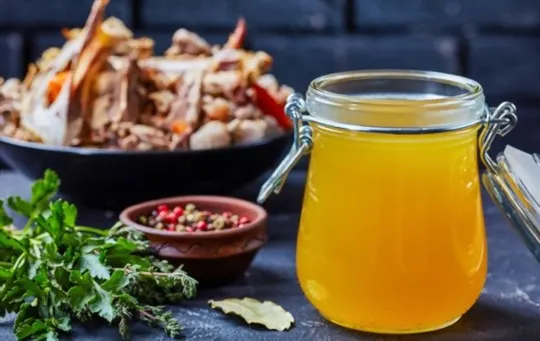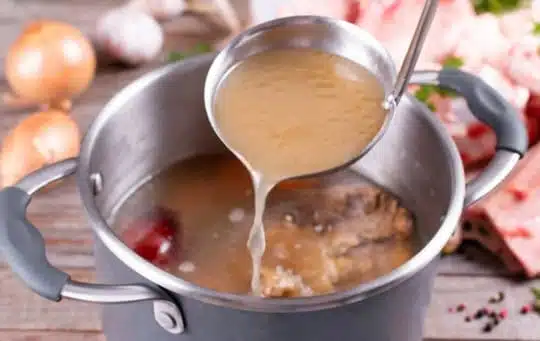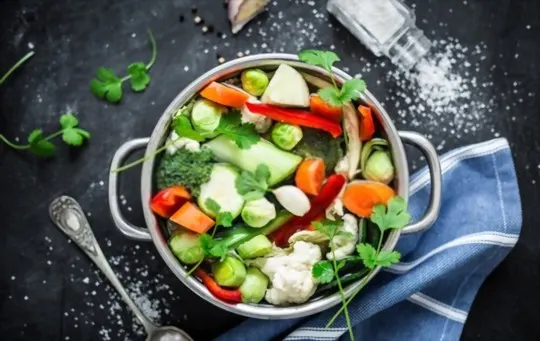Risotto is a classic Italian dish that is known and loved around the world.
It requires a variety of ingredients, one of which is often white wine.
While this ingredient adds depth of flavor to the dish, there may be times when you don’t want to use it – either because you don’t want to buy wine specifically for making risotto, or because you don’t have any on hand.
In such cases, there are several alternatives that can be used to give the same flavor as white wine in risotto.
Knowing the best substitutes for white wine in risotto helps you make delicious risottos with easily available ingredients from your kitchen pantry whenever needed.
In this article, we will discuss why it is important to use white wine in risotto and then list out five of the best substitutes for white wine in risotto.
We will also discuss some do’s and don’ts for substituting wines inrisottos to help ensure a delicious end product.
Finally, we provide a few tips on how to add other unique flavors and aromas to complete this classic dish without using white wine.
What’s White Wine?

White wine is a light-bodied, fragrant alcoholic beverage made from fermented grapes.
It’s one of the most widely available and popular types of wine, with a variety of flavor profiles ranging from dry to sweet.
White wines are generally lower in tannins and acids than reds, making them an ideal choice for risotto dishes.
The acidity helps balance out the creamy textures.
Can You Actually Make Risotto without White Wine?
Risotto is a classic Italian dish containing Arborio rice, liquid, and a variety of other ingredients that change the flavor and texture of the dish.
The most standard recipe requires white wine, but some recipes recommend substituting it with other ingredients if you don’t want to use it.
Using other liquids in place of white wine in risotto isn’t ideal because the alcohol content of white wine helps create a unique flavor and aroma.
However, there are some liquids that can be used as reasonable substitutes.
These include stock (especially broth made from mushrooms or chicken), low-sodium beer, apple cider vinegar, sherry vinegar and orange juice.
Most people prefer stock to any other substitute because it has more robust flavor and contains drippings from roasted meats or vegetables which lend additional depth to finished dishes.
Beer is also a popular choice for this purpose since the addition of hops and malt may lead to bolder flavors when properly combined with rice.
The next runner-up for this purpose is sherry vinegar as its intense taste complements light cooked onion flavors used in preparations like risottos very well.
It also helps cut through heavy cream dishes but may be too acidic for some tastes so be sure to sample it first before pouring into your recipe pan.
Apple cider vinegar is another acceptable substitute but one must remember that its pungent smell might overpower any delicate seasoning elements such as fresh herbs if used in large quantities.
Lastly orange juice provides sweetness while adding liquid at the same time providing color during cooking processes so if you want something more fruity than acidic then this might be best option with less chances of disaster.
Regardless of what substitute you choose just remember to stick with one main idea; stay away from overly sweetened drinks like honey sodas or canned apple juices which will make results overly sweet result instead desired balanced texture raw ingredients should have.
5 Best White Wine Substitutes in Risotto
1 – Chicken Stock

Chicken stock is a classic kitchen staple that can be used in a variety of dishes.
It’s one of the best substitutes for white wine in risotto recipes as it gives the dish flavor without introducing alcohol.
The taste and richness of stock will depend on what type you use.
For best results, try using homemade chicken stocks that have been cooked for several hours to release its deep flavors before adding it to your risotto.
Additionally, substituting the white wine with chicken or vegetable stocks may require additional seasoning (salt and pepper) to achieve desired flavor profiles.
2 – Beef Broth

It can be easy to overlook beef broth or stock as a good alternative for white wine in risotto.
Yes, it does have a distinct and potent flavor all on its own, but combined with the rice and other ingredients, it actually adds a wonderful depth of flavor to the dish.
Plus, you likely already have some handy in your pantry or fridge.
Because beef broth has its own intense flavor profile, you won’t need much; just enough to get the same amount of liquid you’d get from 1/3 cup of dry white wine.
It also works well with higher fat content meats like duck, shrimp or pork belly.
If you choose to use beef broth as your alternative, be sure to decrease any additional salt that is called for in the recipe as it can become too salty otherwise.
3 – Vegetable Stock

Vegetable stock is a great substitute for white wine in risotto if you are looking for a vegetarian-friendly option.
It contains the aromatic flavors and seasoning of white wine without any of the alcohol.
To achieve the same depth of flavor as with white wine, add 1 to 2 tablespoons of tomato paste per cup of vegetable stock.
Then, adjust seasonings and spices as desired to customize the flavor profile of your risotto.
4 – Red Wine

Red wine can also be used to make an amazing risotto, lending an even richer flavor nuance.
When choosing a red wine, pick one with higher acidity, tannin, and notes of sweet blood oranges, cranberries, or spices like black pepper and cinnamon.
White cooking wines are not recommended for red wine risottos as they lack the body and flavor of fresh red wines.
When substituting a red wine in your risotto dish, make sure that you only use half the amount of white wine called for in the recipe.
5 – Dry Sherry

Dry sherry is a great substitute for white wine in risotto.
It has plenty of dry, complex flavors and aromas that are similar to white wine.
The difference is it contains slightly higher levels of sugar and alcohol than white win, which gives it a unique flavor profile.
Make sure to use a dry sherry — none of the sweet or cream sherries — as they will change the flavor profile too much and make the risotto too sweet.
Dry Sherry can be found in most grocery stores, liquor stores or online.
When using it in your risotto recipe, substitute one cup of dry sherry for every cup of white wine you would normally use.
Conclusion
In conclusion, white wine adds a unique flavor to risotto and is a traditional ingredient.
However, if you don’t have any white wine on hand, there are some good alternatives that can give you similar results.
These include chicken broth or stock, dry white vermouth, non-alcoholic sparkling grape juice, lemon juice and cream.
Each of these substitutes will impart its own taste to the dish, so it’s important to think about which one will be the best choice before you begin cooking.
Frequently Asked Questions
What type of wine is used in risotto?
Generally, white wine is the type of wine used in risotto.
What are the best substitutes for white wine in risotto?
The five best substitutes for white wine in risotto are vegetable broth, apple cider vinegar, white grape juice, white wine vinegar, and lemon juice.
Why is white wine used in risotto?
White wine is used in risotto because it adds flavor and depth to the dish, and enhances the flavor of the cheese and other ingredients.

5 Best White Wine Substitutes in Risotto
Ingredients
- 1 – Chicken Stock
- 2 – Beef Broth
- 3 – Vegetable Stock
- 4 – Red Wine
- 5 – Dry Sherry
Instructions
- Choose your preferred substitute from the list of options.
- Organize all of your ingredients.
- Use the proper substitute to cook your recipes.

Carrie is a food writer and editor with more than 15 years of experience. She has worked for some of the biggest names in the food industry, including Bon Appétit, Food & Wine, and Martha Stewart Living.
As the Editor in Chief of IntroChicago.com, Carrie oversees all of the content on the site. She also manages the team of contributing writers and editors, who help to create delicious recipes, helpful tips, and informative articles that you’ll find on the site.
A native of the Chicago area, Carrie is passionate about all things food. She loves trying new restaurants and experimenting with new recipes in her kitchen. She’s also a graduate of the Culinary Institute of America, so she knows a thing or two about food!
